
Journal of Early Modern Studies-Romania
Scope & Guideline
Exploring Romania's Role in the Early Modern European Narrative
Introduction
Aims and Scopes
- Philosophical Inquiry:
The journal frequently engages with philosophical texts and concepts from the early modern period, such as the works of Spinoza, Locke, and Descartes, exploring their implications on contemporary thought. - Art and Visual Culture:
There is a significant focus on the analysis of visual arts from the early modern era, particularly works by influential artists like Caravaggio, which are examined in the context of their historical and cultural significance. - Interdisciplinary Approaches:
The journal adopts interdisciplinary methodologies, combining insights from philosophy, art history, science, and cultural studies to provide a comprehensive understanding of early modern studies. - Historical Contextualization:
Articles often contextualize philosophical ideas and artistic expressions within the broader socio-political and religious landscapes of the early modern period, highlighting the interplay between knowledge and power. - Emerging Themes in Enlightenment Thought:
The journal explores themes related to the Enlightenment, including the evolution of scientific inquiry, human rights, and the role of reason in shaping modernity.
Trending and Emerging
- Visual Narratives and Iconography:
Recent publications highlight a trend towards exploring the narrative and iconographic dimensions of visual art, particularly through the works of Caravaggio, indicating a deeper engagement with the meaning and impact of images. - Philosophical Intersections with Science:
There is a growing focus on the intersections between philosophy and science during the Enlightenment, examining how philosophical thought influenced scientific developments and vice versa. - The Role of Spectatorship:
An emerging theme is the exploration of spectatorship in art, particularly how viewers engage with and interpret iconic images, which has implications for understanding agency and perception in early modern culture. - Revisiting Enlightenment Ideals:
Papers are increasingly revisiting Enlightenment ideals, discussing their relevance to modern issues such as individual rights, governance, and the nature of knowledge, signaling a revival of interest in this critical period. - Cultural Collecting and Knowledge Production:
The journal is also seeing a trend towards examining the practices of collecting and the production of knowledge in the early modern period, reflecting on how these practices shaped cultural narratives and identities.
Declining or Waning
- Focus on Medieval Philosophy:
There appears to be a waning interest in medieval philosophical themes, as recent publications increasingly prioritize early modern thinkers and their contributions rather than earlier medieval thought. - Traditional Historical Narratives:
There is a noticeable decrease in articles that adhere strictly to traditional historical narratives, with a growing inclination towards more nuanced and complex interpretations of early modern events and ideas. - Alchemical Studies:
Interest in alchemical studies has diminished, with fewer papers exploring this theme, possibly due to a shift towards more contemporary scientific discussions and methodologies. - Eurocentric Perspectives:
The journal is moving away from exclusively Eurocentric perspectives, reflecting a broader trend in academia towards inclusivity and the examination of global contexts in early modern studies. - Reductionist Views on Art:
Analyses that reduce artistic expression solely to technical or stylistic elements are less frequent, as there is a growing emphasis on the socio-political and philosophical dimensions of art.
Similar Journals
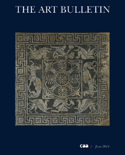
ART BULLETIN
Unveiling the Rich Tapestry of Art HistoryART BULLETIN is a prestigious journal dedicated to the fields of history and visual arts, published by Routledge Journals, Taylor & Francis Ltd. With a rich publication history dating back to 1945, this journal serves as a vital platform for scholarly discourse, presenting cutting-edge research and critical analyses that contribute to our understanding of the arts across various contexts. Despite its Q3 ranking in both the History and Visual Arts categories, the journal has managed to achieve notable stature among its peers, evidenced by its Scopus ranking, placing it in the top 20% for Visual Arts and in the top 25% for History. Scholars and students alike will find valuable insights and innovative perspectives within its pages, making it an essential resource for anyone invested in the academic exploration of art and cultural history. Although currently not open access, the journal is committed to fostering an informed community by disseminating works that encourage scholarly engagement and creative thought.

Early Science and Medicine
Unveiling the Past, Shaping the Future of ScienceEarly Science and Medicine is a renowned academic journal published by BRILL, dedicated to exploring the intersections between historical and medical studies. With a distinguished history since its inception in 1996, the journal caters to an interdisciplinary audience, encompassing vital aspects of History, History and Philosophy of Science, and Medicine. It enjoys commendable rankings, being in the Q2 quartile in History, among others, reflecting its significant contribution to these fields. The journal's editorial commitments aim to advance scholarly discussions on the development of medical practices, theories, and their historical contexts, making it an essential resource for researchers, professionals, and students alike. Although currently not open access, Early Science and Medicine offers comprehensive analyses and rich content that engage with and enrich our understanding of the complex relationship between science and medicine throughout history. For more information, you can find the journal at its esteemed address in Leiden, Netherlands.

Umeni-Art
Celebrating the Dynamic Dialogue between Art and SocietyUmeni-Art is a prominent journal in the field of visual arts and performing arts, published by the Institute of Art History, Academy of Sciences, Czech Republic. With its ISSN 0049-5123 and E-ISSN 1804-6509, the journal has established itself as a critical platform for scholarly discourse and artistic expression since its inception in 2002. Although currently classified in Q4 within the Arts and Humanities category, it aims to elevate the understanding and appreciation of the arts through rigorous research and innovative perspectives. The journal's Scopus ranking places it at Rank #573/667, reflecting its growing contribution to the field and expanding reach within the artistic community. With a focus on fostering collaboration among researchers, practitioners, and students, Umeni-Art seeks to enrich the academic landscape with significant findings and discussions that inspire future research and creative endeavors. While it does not offer open access, the journal remains a valuable resource for those vested in exploring the dynamic interplay between art, culture, and society in the contemporary context.

Zbornik Matice Srpske za Likovne Umetnosti-Matica Srpska Journal for Fine Arts
Advancing Scholarship in Fine Arts and Cultural DialogueZbornik Matice Srpske za Likovne Umetnosti-Matica Srpska Journal for Fine Arts is a prestigious academic journal published by Matica Srpska, dedicated to the study and exploration of fine arts in Serbia and beyond. With the ISSN 0352-6844, this journal serves as a vital platform for researchers, professionals, and students engaged in the visual arts, fostering a rich dialogue on artistic practices, theory, and history. Although currently not an open access publication, it provides invaluable insights into the artistic developments within the Serbian cultural landscape. The journal's commitment to high-quality scholarship is essential in advancing the study of fine arts, ensuring that the contributions reflect the evolving dynamics of artistic expression and cultural heritage. Whether you are a seasoned scholar or an emerging artist, Zbornik Matice Srpske za Likovne Umetnosti invites you to engage with its rigorous research and to contribute to an ever-growing body of knowledge in the realm of fine arts.
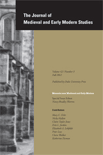
JOURNAL OF MEDIEVAL AND EARLY MODERN STUDIES
Bridging Eras Through Critical ScholarshipThe JOURNAL OF MEDIEVAL AND EARLY MODERN STUDIES, published by DUKE UNIVERSITY PRESS, is a distinguished platform dedicated to exploring the intricacies of medieval and early modern cultures through an interdisciplinary lens. With an ISSN of 1082-9636, this journal has been pivotal in advancing scholarship from 2002 to 2024, providing researchers, professionals, and students with insightful contributions that enhance understanding within the fields of Arts and Humanities and Cultural Studies. With its current standing as Q3 in both category quartiles for 2023 and respectable ranking in Scopus, this publication attracts a diverse readership and stimulates critical conversations about historical narratives and cultural phenomena. Although not an open-access journal, its rich content serves as an invaluable resource for those seeking to delve deeper into the complexities of past societies. The journal’s commitment to excellence in scholarship underscores its vital role in the academic community.
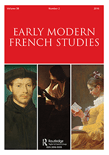
Early Modern French Studies
Illuminating the Complexities of French Literature and HistoryEarly Modern French Studies (ISSN: 2056-3035; E-ISSN: 2056-3043), published by Routledge Journals, Taylor & Francis Ltd, is an essential academic journal that delves into the complexities of early modern French culture, literature, and history. With a focus on interdisciplinary approaches, this journal offers scholars a platform to engage with the evolving dynamics of French studies from 2015 to 2024. Despite its current Q4 ranking in the categories of Cultural Studies, History, and Literature and Literary Theory, Early Modern French Studies seeks to elevate discussions and research that illuminate the richness of the early modern period. While offering traditional subscription options, the journal encourages submissions that challenge prevailing narratives and foster innovative dialogues within the field. This journal is crucial for anyone looking to contribute to or gain insights into the intricate tapestry of early modern French scholarship.

Ancient Asia-Journal of the Society of South Asian Archaeology
Bridging Cultures Through Archaeological DiscoveryAncient Asia - Journal of the Society of South Asian Archaeology, published by ARF India, stands as a pivotal resource for the exploration and dissemination of archaeological research focused on the rich history and culture of South Asia. Since its inception as an Open Access journal in 2006, it has become an essential platform for scholars and enthusiasts alike, boasting an impressive range of quartile rankings across multiple disciplines, including Anthropology, Archaeology, History, and Visual Arts. With expansion into various indexed categories and consistent dissemination of impactful research common to this highly diverse field, Ancient Asia aims to foster interdisciplinary dialogue, facilitate collaboration among researchers, and enhance the global understanding of ancient civilizations within the region. By embracing an inclusive access model, the journal encourages wide readership and engagement, positioning itself as a key player for students, professionals, and academics interested in delving into the archaeological marvels of South Asia.
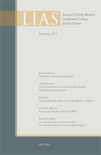
LIAS-Journal of Early Modern Intellectual Culture and its Sources
Cultivating Insights into Early Modern IntellectualismLIAS - Journal of Early Modern Intellectual Culture and its Sources is a distinguished academic journal that delves into the rich tapestry of intellectual thought from the early modern period, exploring the interplay between culture, philosophy, and literature. Published by PEETERS in Belgium, this journal serves as a vital resource for scholars and students alike, offering a platform for rigorous research and innovative perspectives in the fields of History, Literature, and Philosophy. With an ISSN of 2033-4753 and an E-ISSN of 2033-5016, LIAS has earned notable rankings in the 2023 Scopus classifications, reflecting its commitment to scholarly excellence and its growing influence within these disciplines. Although it currently does not offer open access options, it is esteemed for publishing high-quality articles that illuminate the complexities of early modern intellectual culture and its enduring impact on contemporary thought. The journal's well-curated content holds significance for researchers keen on exploring interdisciplinary approaches and contributes meaningfully to ongoing educational discourse.

RENAISSANCE AND REFORMATION
Connecting Past and Present through Scholarly DiscourseRENAISSANCE AND REFORMATION is a distinguished academic journal that serves as a vital resource in the fields of history, literature, arts, and philosophy, with a specific focus on the expansive cultural shifts from the Renaissance to the Reformation. Published in Canada, this journal provides scholars, students, and professionals with an avenue to explore the intricate dynamics that shaped early modern thought and practice. While it is not an open access publication, it maintains a commitment to high academic standards, reflected in its diverse range of quartile placements across various categories, including Q3 in Literature and Literary Theory and Q4 in History. The journal is crucial for advancing scholarly discourse on early modern studies and facilitates a deeper understanding of the cultural and intellectual transformations that occurred during this pivotal historical period. RENAISSANCE AND REFORMATION continues to attract contributions from leading researchers and emerging scholars alike, making it an essential read for anyone invested in the complexities of historical thought and artistic expression.
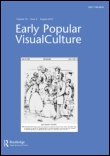
Early Popular Visual Culture
Bridging Disciplines Through Visual StorytellingEarly Popular Visual Culture, published by Routledge Journals, Taylor & Francis Ltd, is a pivotal academic journal dedicated to the interdisciplinary study of visual culture from historical and contemporary perspectives. Since its inception in 2009, this journal has carved out a niche within the academic landscape, achieving a notable Q2 ranking in Visual Arts and Performing Arts and Q3 in both Cultural Studies and History categories as of 2023. With an ISSN of 1746-0654 and E-ISSN of 1746-0662, it serves as a vital platform for scholars to disseminate cutting-edge research and critical analysis on visual phenomena that shape popular culture. The journal not only enhances scholarly discourse but also contributes significantly to the understanding of visual practices across different societies. Researchers, professionals, and students will find this journal invaluable for exploring the intricate interactions between visual culture and social contexts, thereby enriching their academic pursuits and insights.